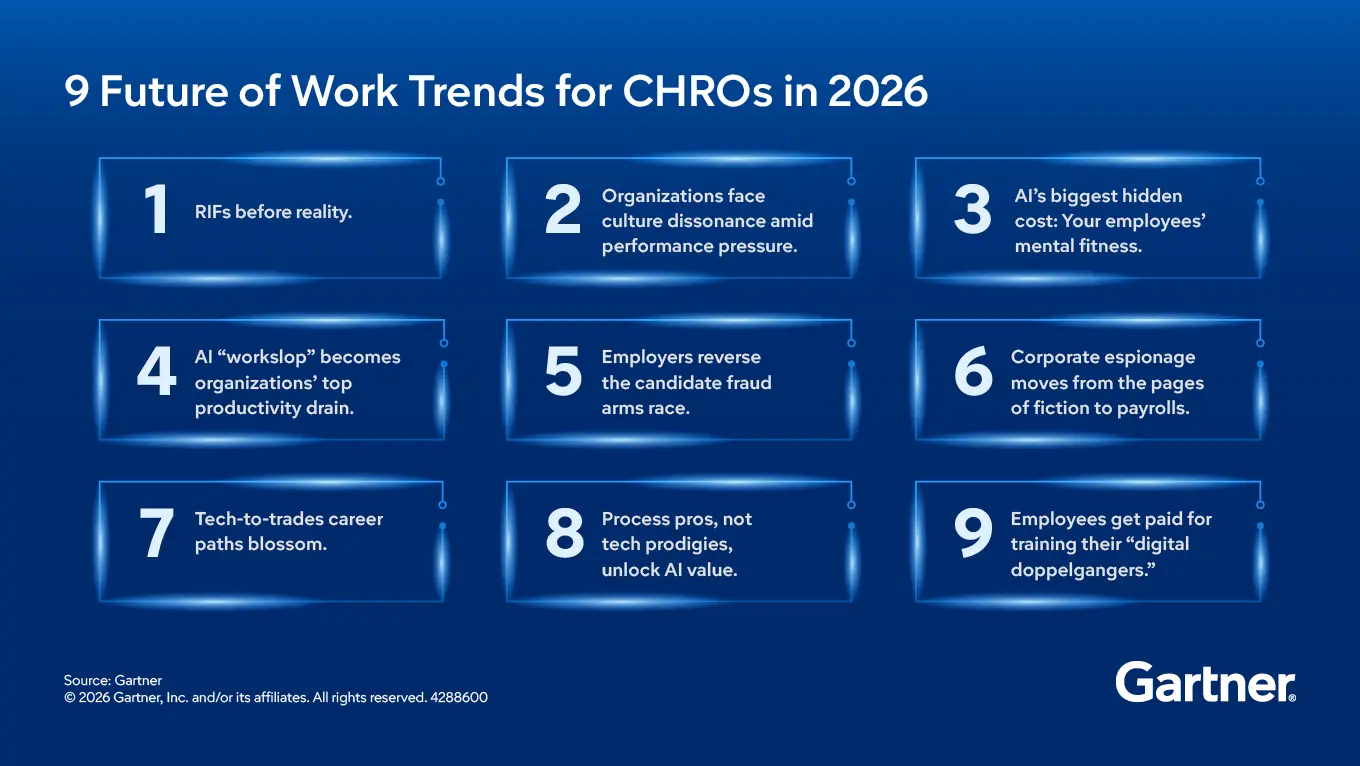Harnessing AI and innovation to drive organizational success and resilience
- Gartner client? Log in for personalized search results.
Future of work trends for CHROs in 2026
Organizations are entering 2026 amid relentless change. CEOs are setting bold growth targets fueled by AI hype, yet only one in 50 AI initiatives delivers transformative value. This tension between promise and reality puts CHROs at the center of a workforce in flux. The Gartner nine future of work trends reveal how technology, talent and trust will shape success — and what leaders must do now to build resilience.
The nine trends shaping 2026:
RIFs before reality.
Organizations face culture dissonance amid performance pressure.
AI’s biggest hidden cost: Your employees’ mental fitness.
AI “workslop” becomes organizations’ top productivity drain.
Employers reverse the candidate fraud arms race.
Corporate espionage moves from the pages of fiction to payrolls.
Tech-to-trades career paths blossom.
Process pros, not tech prodigies, unlock AI value.
Employees get paid for training their “digital doppelgangers.”
How CHROs can act on these future of work trends
The Gartner future of work trends fall into three imperatives: navigating new realities of the human-machine era, mitigating emerging threats and seizing hidden opportunities. Here’s what they mean for your organization.
Navigating new realities of the human-machine era
The employment deal is being rewritten in real time. CEOs are making bold moves based on AI’s promise rather than its proven impact. Layoffs linked to AI dominated headlines last year, but Gartner data shows fewer than 1% were due to actual productivity gains. That disconnect leaves CHROs managing the fallout: skills gaps, morale issues and the risk of rehiring at higher cost.
At the same time, performance pressure is quietly reshaping culture. Employees feel the strain when stated values don’t match day-to-day realities, and trust erodes fast. Add to that the mental toll of near-ubiquitous GenAI adoption (stress, burnout, even cognitive decline), and it’s clear that the human side of transformation needs urgent attention. CHROs who lead with transparency, empathy and proactive well-being strategies will help their organizations navigate this messy middle without losing their people.
Mitigating emerging threats to organizational performance
AI was supposed to make work easier. Instead, in many organizations, it’s creating workslop: low-quality output that employees spend hours fixing. Productivity suffers, and so does confidence in the technology. Meanwhile, hiring has become an AI arms race, with candidates and recruiters locked in a cycle of tech-driven one-upmanship. The result? Rising fraud and falling trust, with Gartner predicting that a quarter of candidate profiles could be fake by 2028.
And as if that wasn’t enough, insider threats and AI-powered espionage are moving from fiction to fact, putting sensitive data — and reputations — at risk. CHROs can’t leave these challenges to IT alone. They need to champion smarter AI adoption, restore authenticity in recruiting and embed security awareness into culture. The organizations that succeed will be those that treat trust and vigilance as strategic assets, not afterthoughts.
Seizing hidden opportunities for the human-machine workforce
Amid the uncertainty, opportunity is everywhere. As white-collar roles face disruption, workers are eyeing “AI-proof” careers in skilled trades — 62% say they’d make the switch for better pay and stability. That’s a talent pipeline waiting to be tapped, if CHROs can offer reskilling and clear career paths. At the same time, the race for technical AI skills is proving short-sighted. The real differentiator? Employees who can rethink processes end-to-end, not just master the latest tool.
Gartner insights show that teams redesigning workflows with AI are twice as likely to exceed revenue goals. And then there’s the frontier of digital doppelgangers: AI replicas of high performers. They promise efficiency but raise big questions about rights, compensation and trust. CHROs who lean into these opportunities with foresight and fairness will help their organizations thrive in a future where human and machine work side by side.
FAQs on the 2026 Future of Work Trends
What are the most important future of work themes in 2026?
Three buckets: navigating new human-machine realities (layoffs, culture, mental fitness), mitigating threats (workslop, hiring fraud, insider risk), and seizing opportunities (tech-to-trades, process redesign, digital doppelgangers).
How should CHROs balance AI ambition with today’s performance needs?
Ground workforce decisions in evidenced impact, redesign processes for effort reduction, and make culture and well-being explicit parts of the operating model — while building skills and policies for emerging AI use cases.
Where can organizations start to show near-term value from AI?
Target high-friction workflows, pilot with clear success metrics tied to business outcomes (not tool usage), document gaps that block scale, and communicate lessons learned to secure sponsorship and funding.
Attend a Conference
Join Gartner experts and your peers to accelerate growth
Gather alongside your peers in Orlando to gain insights on emerging trends, receive one-on-one guidance from a Gartner expert and create a strategy to tackle your priorities head-on.
Gartner HR Symposium/Xpo™
Orlando, FL

Drive stronger performance on your mission-critical priorities.
